World War Two: Week by Week - Season 3

Season 3
Year 3

Episodes
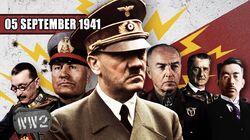
September 5, 1941
It is two years this week since Germany invaded Poland. That European conflict soon became a global one. Japan's invasion of China began two years before that, but with Japan allied to the Axis Powers, they are now the same conflict. Those Axis are all fighting together now to try and defeat the Soviet Union, but the war has grown not just in the scale of the armies fighting, but also in the scale of man's inhumanity to man. We see that this week in German occupied territory.

September 12, 1941
The German invasion of the Soviet Union has taken enormous amounts of territory, but this week the Red Army not only stops the Germans, they score a ringing victory. However, Leningrad comes under siege and Kiev is in great danger, and Adolf Hitler is issuing directives for the next phase of the Operation.

September 19, 1941
Kiev falls to the Germans, yielding hundreds of thousands of prisoners as whole armies are surrounded, but behind the lines all over German-occupied territories, partisan movements are gaining steam. Meanwhile, in China, Japan launches another campaign against Changsha.

September 26, 1941
In former Yugoslavia, the Republic of Uzice breaks free from the German occupation, even as the Germans are mopping up the masses of shattered Soviet Armies after last week's capture of Kiev. In the north, it really looks as if Leningrad will hold out for the time being, and German troops from both north and south converge on the center for the coming drive on Moscow.
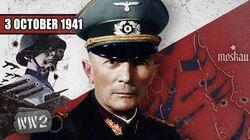
October 3, 1941
Adolf Hitler's renewed drive on Moscow, the Soviet capital, begins this week, even as the Japanese drive on Changsha ends. But major news this week is the colossal amount of equipment, arms, and ammunition that Britain and the neutral USA plan to ship to the beleaguered Soviet Union.
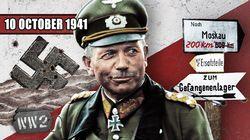
October 10, 1941
The road to Moscow does indeed lay open before the Germans, but for how long? And can they exploit such an opportunity- since the panzers are busy encircling hundreds of thousands of Soviet soldiers near Vyazema? Georgy Zhukov arrives in Moscow to take charge of the Soviet defenses and try to shut the door.
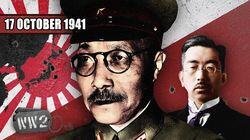
October 17, 1941
Moscow panics as the Germans edge closer and take prisoners by the hundreds of thousands, even as the temperature drops far below freezing. At home in Germany, Josef Goebbels has a problem - he's promised victory too soon and too often. And in Japan, a government falls.

October 24, 1941
The Germans draw ever closer to Moscow, but Soviet reinforcements have begun to arrive from Siberia and the city's defenses have grown stronger. Meanwhile in the south, the Germans are sweeping into the Crimea and looking hungrily at the Caucasus.

October 31, 1941
Operation Typhoon is halted until the coming winter can freeze enough ground to increase mobility. But the ever colder weather is a disaster waiting to happen for an already over-stretched German supply line.

November 7, 1941
There is a lull now on the Eastern Front, and Adolf Hitler uses the time to plan another drive on Moscow and points beyond, but he'll be facing a larger Red Army, as reinforcements and recruits hope to nearly double its size in a matter of weeks. The British are counting down the days to their upcoming North African offensive, and the Japanese are sending out orders that will change the world dramatically in a single morning.
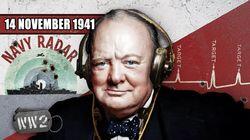
November 14, 1941
The British sink an entire convoy of supplies heading for Rommel in North Africa by using radar at night, something their opponents lack. In North Africa itself, the Allies are gearing up for a major offensive to begin in a few days. Meanwhile, the Germans are gearing up for a renewed drive on Moscow even as Georgy Zhukov launches small attacks there designed to spoil the larger German plans.

November 21, 1941
The long planned Allied Offensive in North Africa- Operation Crusader- begins, but the Allies are worrying about how to defend Singapore in case of Japanese aggression. The Germans renew their drive on Moscow, but their number one flying ace perishes, a major PR hit.
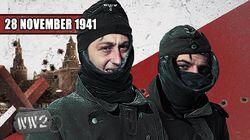
November 28, 1941
The German advance has pushed within artillery range of Moscow, but can they reach it- and take it- before the Red Army and the murderously cold weather halt them? Meanwhile in North Africa, both Erwin Rommel and Claude Auchinlek make daring and brilliant moves that save the fight for their sides. A mighty Japanese fleet is now secretly heading for Hawaii to make a surprise attack on American territory while the US worries where in Southeast Asia the Japanese are planning to attack.
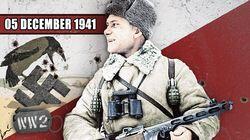
December 5, 1941
The Wehrmacht is halted by the Red Army at the gates of Moscow. Not only that, but a Red Army counteroffensive begins pushing the Germans back decisively. The Germans are also beginning to withdraw from their siege of Tobruk in North Africa. Japan, however, is advancing all over the Pacific, sending troop transports into the South China Sea, though it is unclear just whom Japan plans to attack. The Japanese are also- in top secrecy- sending a force of aircraft carriers to soon attack the American Pacific fleet at anchor at Pearl Harbor.
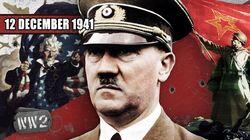
December 12, 1941
The Japanese launch attacks all over Southeast Asia and the Pacific, and launch a preemptive surprise attack on the American Pacific Fleet at Pearl Harbor. The war is suddenly much larger. In the USSR, the Germans find themselves now heavily on the defensive after the failure to take Moscow, while in North Africa, Erwin Rommel decides he must withdraw out of Cyrenaica to await reinforcements.
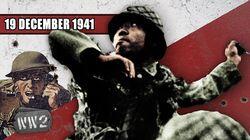
December 19, 1941
The Japanese make gains in Malaya, Burma, Hong Kong, Borneo, and the Philippines. The Allies also have trouble in the Atlantic and the Mediterranean, where they are beginning to seriously suffer from a lack of capital ships. The Soviet Red Army is advancing, though, and Stalin takes personal control of planning for the upcoming counteroffensive, while Adolf Hitler takes personal control of the German Army.

December 26, 1941
The Japanese offensives and advances in Southeast Asia and the Pacific continue unabated and both Hong Kong and Wake Island fall. British and American leaders begin the Arcadia Conference to decide just how they are going to fight this war together, and there are more changes made in the German High Command on the Eastern Front, even as the Soviets make advances there.
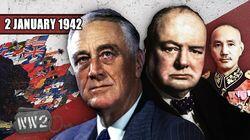
January 2, 1942
At the ongoing Arcadia Conference, 26 nations sign the Declaration of the United Nations. Otherwise it is very much a week of motion and changes in motion: in the USSR the Soviets are on the move in the center and the Crimea, the Japanese are slowing their movement in China, the Americans are finishing their movement in the Philippines, and the Axis are moving backward in North Africa. The Luftwaffe also decides that Malta must be eliminated as a base for the Allies.

January 9, 1942
The US government realizes that it cannot send help to relieve the US and Filipino forces in the Philippines, but it does not tell those forces. Meanwhile in the USSR, a huge Red Army offensive against entrenched German forces begins along the entire frontline. The Germans have pulled back in North Africa, though, to consolidate. The Japanese enter Manila and advance in Malaya, but are forced to withdraw in China.
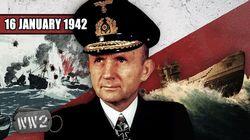
January 16, 1942
Operation Pauchenslag, long-range German submarines operating just of the US Coast, kicks into action this week, as does the Japanese invasion of the Dutch East Indies. They also take Kuala Lumpur. Meanwhile, the Soviet Red Army offensive all along the Eastern Front has its first full week of action, with the Soviets making some real territorial gains in the center, though a German offensive in the Crimea catches them off guard.

January 23, 1942
Nazi Germnay's "Holocaust by Bullets" has already claimed over a million lives over the past 8 months; this week German authorities hold a conference to streamline and systematize the process of extermination. Gas will now be the preferred method of murder. The Japanese are murdering Allied soldiers that fall into their hands as they advance ever closer to Singapore. The Soviet offensive continues along the entire Eastern Front, but the orders and objectives grow ever more confusing and chaotic. In North Africa, Erwin Rommel launches a surprise offensive against the Allies and make a lightning advance the final two days of the week.
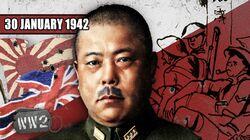
January 30, 1942
The Japanese advance on Singapore has gotten close enough that the British have destroyed the causeway to Singapore Island. The Japanese are also making attacks in the Solomon Islands, Burma, the Philippines, and the Dutch East Indies- their threat to Australia is real. Erwin Rommel's surprise spoiler offensive in North Africa takes Benghazi, and on the eastern front the Soviets break a hole in the German lines in the north even as the temperature drops to the -50s.
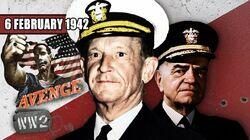
February 6, 1942
The Japanese advance in Burma and the Dutch East Indies, but they've reached the end of the Malayan Campaign- Singapore, which they have under siege. They now prepare for the final assault. The Allies are going on the offensive at sea, though, in the Marshalls-Gilberts Raids, while on land in the Soviet Union the Red Army launches another series of offensives against the Germans.
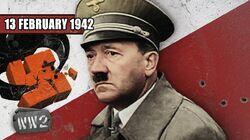
February 13, 1942
The Soviet Red Army has managed to surround some 100,000 German soldiers in the Demyansk Pocket. The Allies are surrounded in Fortress Singapore and the Japanese spend the week breaking in. The Allies are also unable to supply Malta by ship because of continuous heavy Axis bombing of the island and its surroundings, which bodes ill for Allied operations in North Africa. The Germans also make a bold naval move this week- sending two capital ships right up the English Channel under British noses, making for German ports.

February 20, 1942
The most humiliating defeat in British history according to Winston Churchill- 80,000 men lost as prisoners of war! Humiliated by an enemy far less numerous than themselves! There are many ways to describe the fall of Singapore; these are but two of them. The Japanese are also bombing Australia and invading Sumatra, Bali, and Timor this week, so they are certainly not resting on their laurels. Meanwhile in the Soviet Union, thousands of Red Army paratroops are dropping behind German lines.

February 27, 1942
The Japanese are advancing in the Dutch East Indies and Burma, brushing aside defenders, but their biggest victory this week is at sea, when they not only brush aside the ABDA Fleet, but literally wipe it out of existence. Meanwhile Italian and Germans submarines are patrolling the Caribbean, sinking any Allied merchant shipping they find. It is yet another week of Axis successes.

March 6, 1942
The Japanese advance in Burma continues, threatening Rangoon, and also make landings on Java and New Guinea. They even go so far as an air raid on Broome, Australia. The British are making raids of their own this week, Operation Biting against Bruneval in German-occupied France. As for the Germans themselves, 100,000 of them are still surrounded by the Red Army at Demyansk, and Hitler is told that the Soviets might have enough reserves to defend against a renewed summer offensive.

13 March 1942
Rangoon in Burma falls to the invaders without a shot, the Dutch East Indies surrender 100,000 men to them at Batavia, and the Japanese land on New Guinea and begin their advance on port Moresby. The first phase of their offensives is now over. The Philippines still hold out, their armies under siege at Bataan, but Douglas MacArthur, Allied commander there, has made his getaway, one day to hopefully return. American troops do begin landings on New Caledonia, to build a base there to begin the fight back.

20 March 1942
MacArthur makes one of the most iconic remarks of the whole war, but considering the fact that the Philippines seem unsalvageable, it's pretty unclear just how he'll do it, especially since even though ever more American soldiers are arriving in Australia, the Japanese threat to Australia grows daily. Bill Slim arrives in Burma to take command of I Burma Corps, and Joe Stilwell has taken over two Chinese Nationalist armies, so the defense of Burma looks like it might go on a while longer, though the Allies are at a serious disadvantage after losing Rangoon. The Japanese, for their part, are trying to figure out how the heck they're going to administer all the territory they've taken this year and bring natural resources to Japan itself. There is still scattered fighting in the USSR, but the spring muds have put pad to any major offensives for the time being. As for the British, they launch Operation Outward, a hydrogen balloon campaign over Germany. Yep, you read that right. What a week.

27 March 1942
The Allies make plans to bring the war to Germany by possibly attacking in North Africa. Holding Malta might be the key to such adventures, but it is increasingly harder to do. The Soviets and German make plans for adding millions of soldiers to their ranks, while springtime mud has kept the front mostly quiet. The Japanese plans for the conquest of Burma are still advancing, though the fighting this week is especially brutal.

4 April 1942
Britain's campaign to firebomb the old towns of Germany where civilians reside begins in earnest this week. The British also destroy the port at St. Nazaire in commando action. In the Indian Ocean, however, they are avoiding contact with the Japanese, even while on land the Japanese advance in both Burma and New Guinea.

11 April 1942
After holding out since the beginning of the year, the American and Filipino defenders at Bataan can do so no more, and they surrender to the Japanese- the Bataan Death March for the 75,000 prisoners begins. Meanwhile, the Japanese carrier fleet launches a raid on Colombo and shipping in the Bay of Bengal, wrecking Britain's Eastern Fleet in the process and forcing them to move to African coastal bases. Adolf Hitler issues the directive outlining his plans for a summer offensive against the USSR that aim south toward the Caucasus.

18 April 1942
The Doolittle Raid is just a little bombing raid over Tokyo that doesn't do that much physical damage. It does, however, have big repercussions- partly in terms of future offensive plans for the Japanese fleet, and partly in terms of the thousands of Chinese lives taken in reprisals for allowing the US bombers to land in China. There is small scattered action on the Eastern Front, more Japanese advances in Burma, and a French VIP escapes captivity in Germany and heads for Switzerland and freedom.
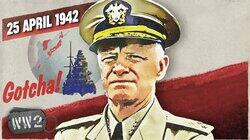
25 April 1942
After last week's Doolittle Raid on Tokyo, pretty much the entire Japanese fleet is sent out looking for American ships. They do not find them, but the enormous amount of radio traffic they generate is a treasure trove for Allied codebreakers to work on. The Allies ship 46 British Spitfire planes to Malta... and all of them are destroyed by the Axis within 48 hours. Germany begins bombing tourist and cultural destinations in Britain, and to make things even worse for the British this week, they realize they can't hold Burma and are now making tracks for India, with the Japanese Army in hot pursuit.

2 May 1942
Now Burma and control of the Burma Road have fallen to the Japanese. Can nothing stop them? The Allies are thinking about maybe using the Solomon Islands as a base to build to try and fight back, but to do that they'll need control of the Coral Sea, but both sides are sending warships there since the Japanese plan to take Port Moresby. The Allies are aware of this, however, since they have the advantage of being able to read a substantial part of japan's radio traffic. It is a week of foreshadowing not just there, but also as the Allies send ships to take Madagascar from the Vichy French and the Soviets prepare to launch an offensive in the south of the Eastern Front.
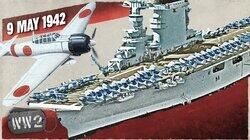
9 May 1942
This week sees a major clash between the naval forces of the Japanese and the Allies. Both sides take big damage, though on the tactical level it is a victory for the Japanese. Operationally, however, they must postpone their attacks towards Port Moresby. They are busy making plans all the while, though, for their upcoming attack against Midway Atoll in the Central Pacific. They also finally have success ending an offensive this week with the conquest of the Philippines when Corregidor falls. Japan's ally Germany begins an offensive of their own this week on the Kerch Peninsula. The Allies, for their part, launch an offensive of their own this week against Vichy French-held Madagascar, and they take the main port, Diego Suarez.
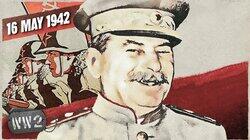
16 May 1942
The Soviets pre-empt a German offensive with one of their own in the south of the Eastern Front, but that's not the only fighting. The skies over Malta and the waters of the Gulf of St. Lawrence are full of action. Meanwhile, two races against time - and the Japanese - come to an end in India.
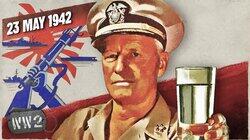
23 May 1942
Soviet Foreign Minister Molotov arrives in London to meet with Churchill, but at home in the USSR the Germans have launched an instantly successful offensive. In North Africa and Malta the British are building up, unaware that Erwin Rommel is just about to strike, and an American ruse discovers secret Japanese attack plans.

30 May 1942
Erwin Rommel begins his surprise new offensive with "Rommel's Moonlight Ride", bringing all of his mighty mobile units to the fray in North Africa, while in the Pacific, dozens of warships and tens of thousands of men set sail from Japan- their mission? Attack the Aleutian Islands and Midway Island, but above all, destroy the US Pacific Fleet!
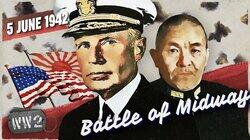
5 June 1942
The supposedly surprise Japanese operations against Midway Atoll and the Aleutian Islands kick-off, but they don't know that Allied intelligence has cracked their codes. As the Japanese fleet advances in the Central Pacific and Japanese planes bomb Midway, the US Navy has a big surprise waiting for them.
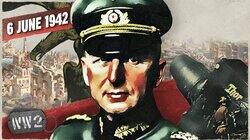
6 June 1942
Midway isn't the only fight right now. Germany is trying to crack the mighty fortress of Sevastopol and take the whole Crimea. In North Africa, Rommel is routing the Allies, but in Malta the arrival of ever more fighter planes bodes well for the Allies.
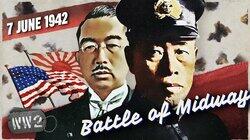
7 June 1942
We left off last time with several burning behemoths. Watch today to see the action that follows, not just on the high seas, but also in Alaska. We also turn to Washington DC and Tokyo and follow the reaction to the Battle of Midway there. The Japanese one may surprise you.
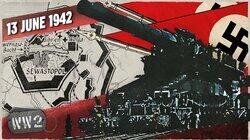
13 June, 1942
It's a week of starts and stops. The Battle of Sevastopol kicks into high gear, and the Battle of Gazala enters its third phase. And what is going on in the Pacific just one week after Midway?

20 June 1942
Two convoys head from opposite ends of the Mediterranean to supply Malta, hoping to run interference for each other, and the Battle of Sevastopol continues as the Axis slowly wear down the Soviet defenders, but the big news is Erwin Rommel's continued advances in North Africa, defeating the 8th Army again and again. Can the Allies hold Tobruk? Will they even try? Watch and find out.

26 June 1942
Fall Blau, the huge Axis summer offensive in the Soviet Union, is supposed to being this, but is postponed to next. The smaller Operation Fridericus II does begin though, and what dos Josef Stalin make of that and the intelligence he's received? Meanwhile in North Africa, after the fall of Tobruk, the British 8th Army gets a leadership change, but Erwin Rommel is still on the move eastward into Egypt. Where will the Allies try to hold him? Half the world away, the Allies begin to establish a base at Milne Bay, New Guinea. It's a start, a small one, but a start.
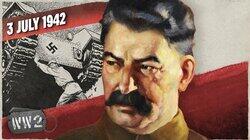
3 July 1942
It's that time of the year again- the time when the Axis Powers drive deep into the Soviet Union. Fall Blau is the name of this year's huge offensive, and it begins this week, making great gains from the very beginning, but the Axis Powers are also making big gains this week in North Africa, taking Mersa Matruh and pushing to within 100 km of Alexandria. Can nothing stop them?

10 July 1942
Adolf Hitler is not happy, and yet phase one of Fall Blau has accomplished all of its goals and done so ahead of the timetable. However, the Soviet Army in 1942 is not the same as that in 1941, and is not waiting around this time to be captured by the hundreds of thousands, and if things continue then the Axis might just be wasting a ton of gas to take a ton of empty space.

17 July 1942
The second phase of Fall Blau begins with second guessing by the Axis Powers and constant changes in directive. The Soviet Union's response to the successes of the first phase of Fall Blau is equally chaotic. Over in North Africa there is the question of it maybe ending in stalemate.

24 July 1942
The Soviets keep withdrawing from the advancing Axis forces, and Hitler keeps issuing contrary orders to try and stop that, with the results that logistics are getting screwed up and the mobile units are bogged down in huge traffic jams. The Allies have decided not to open a second front in Europe in 1942, but do choose another spot to begin the long counter offensive.

27 July 1942
"I said DAMN, this traffic jam... How I hate to be late, hurts my motor to go so slow. Time I get home my supper be cold. Damn, this traffic jam." (James Taylor, the Eastern Front, 1942)

31 July 1942
Operation Edelweiss opens with a blast, and as the Wehrmacht closes in on Stalingrad, Stalin issues that famous order. There aren't just big actions in the East, the Japanese have landed in New Guinea, the Allies try one more offensive at El Alamein, and the Americans have locked in on Guadalcanal.

7 August 1942
The Axis Forces are on the move on the Eastern Front and in the Caucasus, but this week the Allies begin an offensive of their own: this week come Allied landings and attacks on Guadalcanal and nearby islands, the first American offensive against the Japanese.

14 August 1942
The Axis advance into the Caucasus is going great... except the oil towns they take have no oil, and wasn't that the whole purpose? Meanwhile in the Pacific, the US Navy is suffering perhaps its greatest defeat ever off Savo Island, even as the Marines take Tulagi, Gavutu, and Tanambogo.
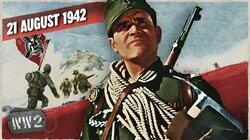
21 August 1942
The Axis advance in the Caucasus takes Mt. Elbrus, and the one on Stalingrad continues, and there are several raids of note this week- a Japanese one on Guadalcanal is destroyed, an Allied one on Dieppe is badly savaged, and an American one at Makin Atoll is successful in the short term, but with bad long term ramifications.
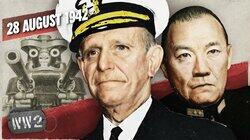
28 August 1942
The Battle of the Eastern Solomons takes place this week- another carrier battle. As for the Germans, they're advancing on Stalingrad, slowing down in the Caucasus, and Erwin Rommel is preparing to launch another assault in North Africa.
Recently Updated Shows

Creature Commandos
Creature Commandos tracks a secret team of incarcerated monsters recruited for missions deemed too dangerous for humans. When all else fails... they're your last, worst option.

The Masked Singer
Part guessing game and part singing show, The Masked Singer sees 12 famous faces compete to pull off the best performance, with their identity elaborately and imaginatively concealed, thanks to an expert team of talented costume designers. The stars will be transformed and they will take on a masked identity and become a fantastic character which will disguise them for the whole series.
Forget any thoughts of fancy dress – they'll be full-on, original, movie-standard creations taking inspiration from worlds as varied as manga, superheroes, and wild animals and mythical creatures. Their transformations will be total, even their speaking voices will be disguised in interviews.
It will be up to a superstar panel to lead the viewers at home in their quest to discover who they are. Although the stars aren't judged on their voices, they'll still need to give their best performance – the audience's least favourite will be eliminated, before the panel try to guess their identity and unmask them.

Mrs. Brown's Boys
Comedy starring Brendan O'Carroll as loud-mouthed Irish matriarch Agnes Brown, whose favourite pastime is meddling in the lives of her six children.

The Newsreader
In the maelstrom of a commercial television newsroom in 1986, Dale Jennings is a diligent young reporter, desperate to become a newsreader. Helen Norville is a notoriously ‘difficult' star newsreader determined to build credibility. Paired together over three months, Dale and Helen will cover an extraordinary chain of news events — from the shock of the Challenger explosion, to the hype of Halley's Comet, to the complexities of the AIDS crisis. From messy beginnings, a deep bond is formed that will upend their lives and transform the very fabric of the nightly news bulletin. This is a story of a grand, unconventional relationship in a world on the cusp of change.
